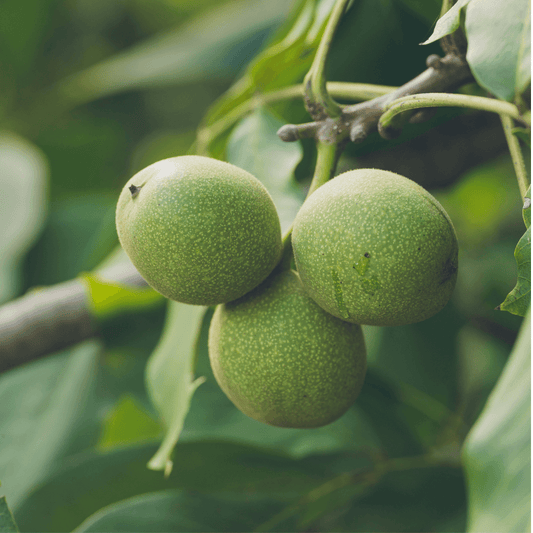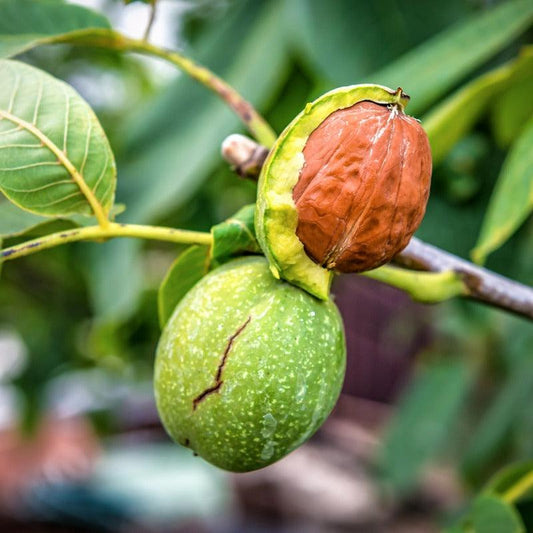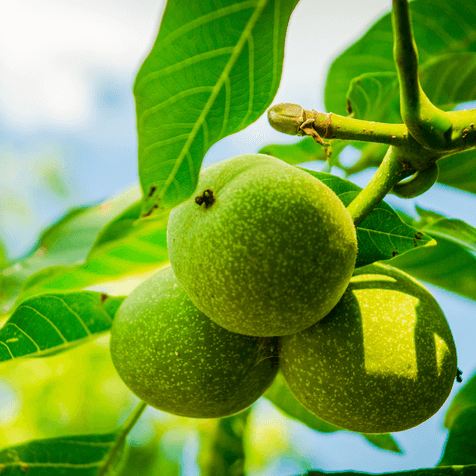Types of Walnut Trees and Walnut Varieties: How to Choose the Best for Your Orchard
Choosing among the many types of walnut trees can feel overwhelming. The “right” choice depends on taste, shell thickness, climate, and how you plan to use the nuts—or even whether you want a great shade tree.
This friendly guide walks through the main walnut tree types, standout walnut cultivars, and simple ways to match a tree to your site and goals. If you’re ready to shop, browse our curated selection of walnut trees, and for step-by-step planting help, see our comprehensive guide to growing walnut trees.

The Big Picture: Walnut Types You’ll See Most
Walnuts are nut trees in the genus Juglans. They have separate male and female flowers on the same tree (catkins for pollen; small terminal flowers for nuts). Most trees produce reliably when they get enough chill hours, sun, and water.
English/Persian Walnut (Juglans regia)
Often called english walnut trees, Persian walnut, or common walnut, this species gives the classic, light-colored kernels and thin shelled nuts that are easy to crack open. It’s the main commercial walnut in the United States thanks to high quality nuts and strong yields.
Popular walnut varieties include Chandler, Hartley, Howard, Tulare, and Franquette. If you want the best walnut tree for eating, English types are usually the winner—and many growers consider Chandler the best walnut variety and even the best tasting walnut variety for mild climates.
Black Walnut (Juglans nigra)
Black walnut trees (aka black walnut juglans nigra) are native to North America. They have richly flavored, darker kernels with thicker shells. The nuts are trickier to process but prized for baking and traditional recipes.
Trees are tough, long-lived, and make exceptional timber. Note: black walnuts exude juglone, which can bother nearby plants—choose companions from our guide to companion plants that tolerate black walnut tree toxicity.
California Black Walnut (Juglans hindsii)
A western relative often used as a rootstock; also grown as a hardy shade tree. You’ll see it in breeding and orchard systems as california black walnut or in Paradox hybrids (black walnut × English) that boost vigor and disease resistance in grafted trees.
Butternut (Juglans cinerea)
The butternut tree (juglans cinerea) is a cold-tolerant North American species with elongated, richly flavored nuts. It faces disease pressure (butternut canker), so check region-specific guidance before planting.
Japanese Walnut & Heartnut (Juglans ailantifolia)
Japanese walnut includes the heartnut form, known for heart-shaped, thin-shelled nuts that are easy to crack and fun for fresh eating. They can be quite cold hardy and are a great option where winters are long.

Choosing the Best Walnut Tree (for You)
Matching walnut types to your site is the secret to success. Start with climate and soil, then weigh taste, shell, and harvest goals. For a quick site checklist, read understanding climate and soil requirements for walnut trees.
Climate Fit
- Mild, long seasons: English/Persian (Chandler, Hartley, Howard, Tulare).
- Colder zones: Franquette (late leafing English), heartnut, some black walnuts, and select hybrids are more cold hardy.
- Variable or wet soils: Consider grafted English on vigorous, disease-tolerant rootstocks (e.g., Paradox) for extra disease resistance.
Taste & Use
- Best walnut tree for eating / best walnut tree: Most home growers pick English/Persian for easy cracking and sweet flavor.
- Best tasting walnut variety: Chandler is a frequent favorite for kernel quality and color.
- Robust “wild” flavor: Black walnut and butternut are deeper, earthier, and great for baking.
Orchard Layout & Pollination
Most English walnut cultivars benefit from a compatible pollinizer for top yields (even if partially self-fertile). Stagger bloom types to ensure pollen overlaps.

Quick Guide to Popular Walnut Varieties
- Chandler (English): Very light kernels, thin shelled, high yield; widely planted in the United States; often named the best walnut variety for fresh eating and market.
- Hartley (English): Classic nut shape and flavor; reliable and popular for home and farm.
- Franquette (English): Late leafing—good for frost pockets; solid quality.
- Howard / Tulare (English): Productive, quality nuts; some field tolerance to diseases.
- Black Walnut (named selections): ‘Thomas,’ ‘Sparrow,’ and others offer improved nut size and cracking over seedlings.
- Heartnut (Japanese walnut form): Uniquely shaped, easier to crack open, fun for fresh use.
Need a deeper dive before you plant? See a comprehensive guide to growing walnut trees.
Planting Tips for Success
- Sun & spacing: Plant in full sun with room for mature canopy and equipment access.
- Soil prep: Good drainage is key. Amend heavy soils and avoid low, wet spots.
- Care basics: Water deeply in dry spells; prune to maintain structure and light.
- Disease & pest awareness: Choose cultivars with disease resistance, and scout regularly.
Ready to pick your tree? Explore walnut tree varieties in our collection.
Next Steps
Match your climate and soils first (see climate and soil requirements), then choose a cultivar that fits your taste and toolbox.
If you’ll plant near black walnuts, plan beds with companion plants tolerant of juglone. With the right variety and site prep, your walnut will reward you for decades.




